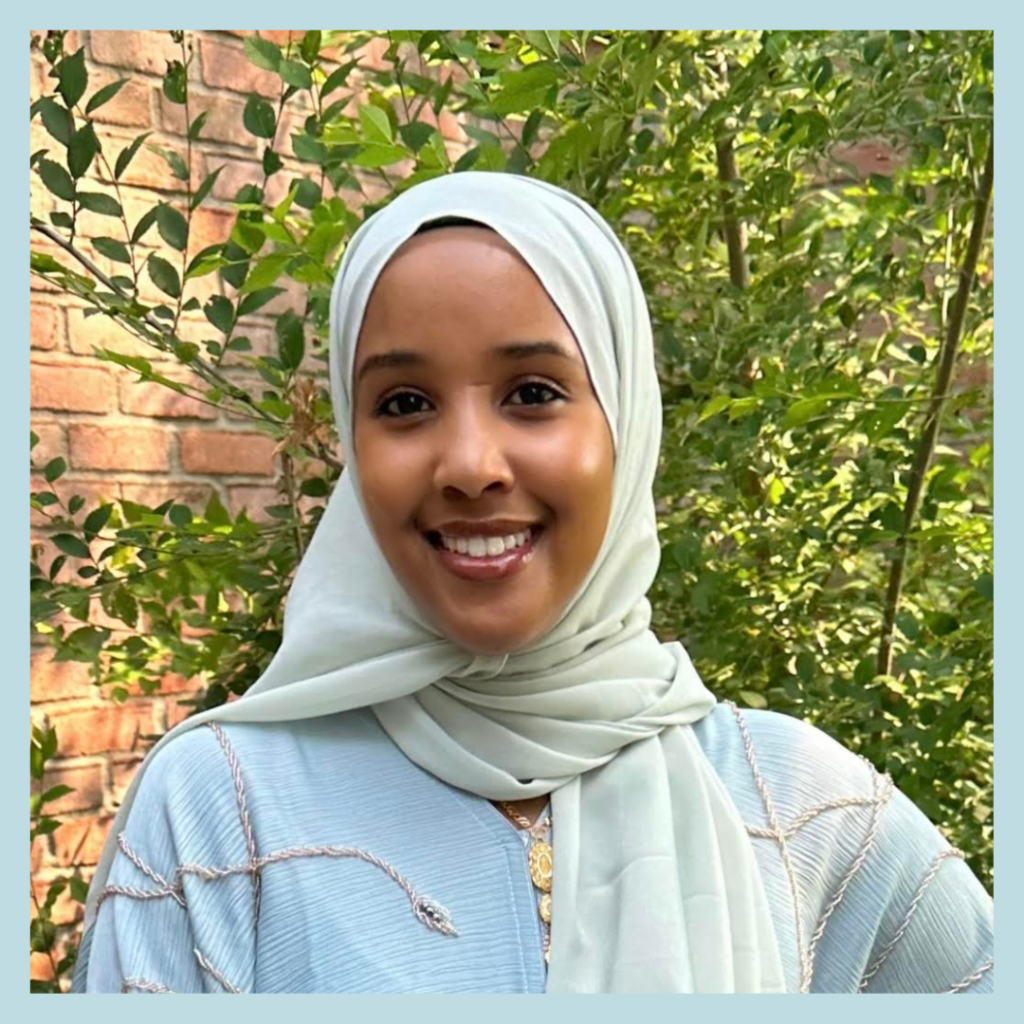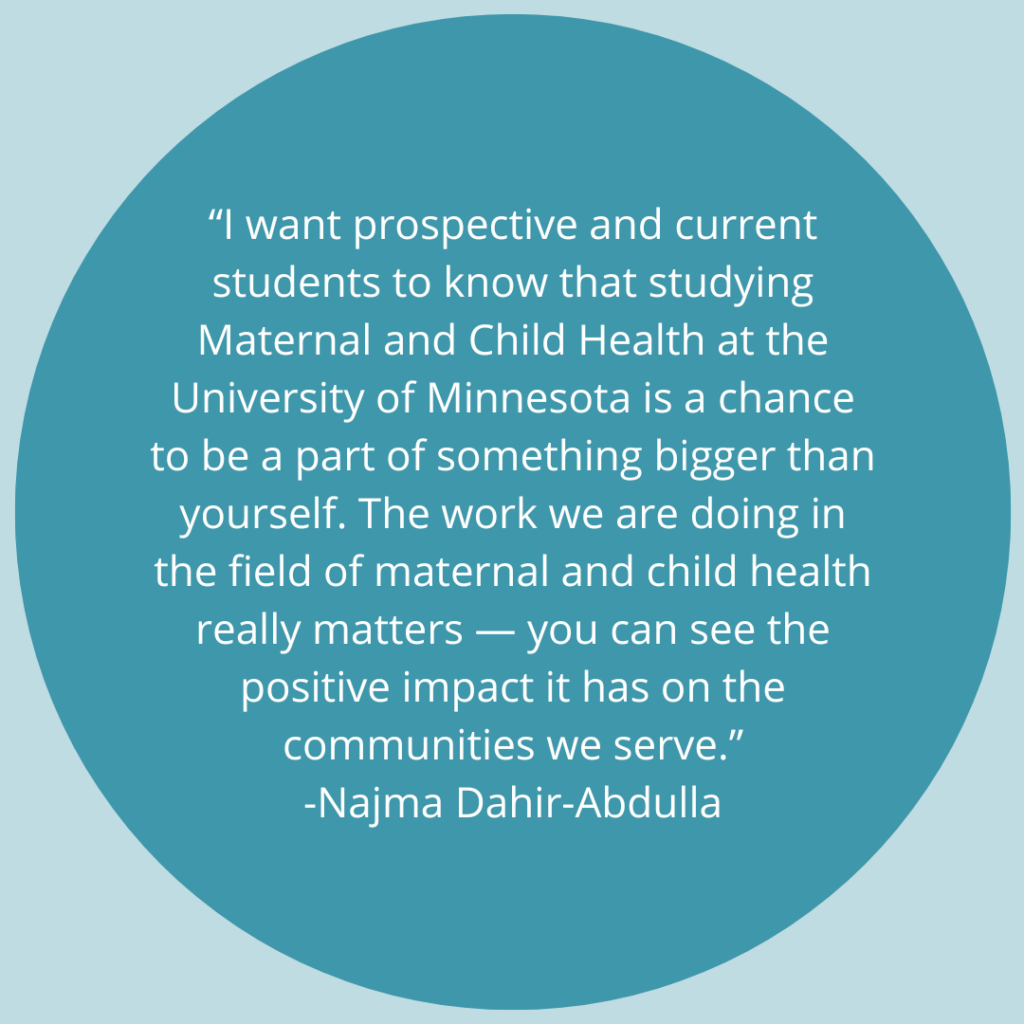#UMNMCH student Najma Dahir-Abdulla (MPH 2025) describes her deployment at the Innovations for Maternal Health Outcomes in Minnesota (I-MOM) program at the Minnesota Department of Health. As a part of her deployment, she played a key role in managing evaluations for perinatal health improvement initiatives and communicating important maternal health program updates across the state. Najma hopes to use the skills she’s built at her deployment and as an MPH student to advance health outcomes using community-based solutions.
Reflections from my Deployment
What are you currently working on? How’d you get involved?
Throughout the last year of my deployment, I have been working with the grant-funded Innovations for Maternal Health Outcomes in Minnesota (I-MOM) program at the Minnesota Department of Health. The vision of the I-MOM program is to align and strengthen the implementation of innovative, data-driven, community-informed and supported perinatal health programs to improve outcomes for communities experiencing the highest rates of negative health outcomes.
In my role as a Maternal Health Innovations Intern, I support various initiatives related to improving maternal health outcomes. I help produce the program’s newsletter and manage the Perinatal Subcommittee’s quarterly evaluation. The purpose of the evaluation is to assess the effectiveness of the Perinatal Sub-Committee efforts. The Perinatal Subcommittee is made up of professionals who work in the field of maternal health. One of the main goals of the Perinatal Sub-committee is to create recommendations to improve perinatal health care and programming in Minnesota. I designed the evaluation survey and worked with my internship supervisor to disseminate the survey to the members of the sub-committee. Once all results were collected, I was able to synthesize the findings, report out the results, and work with the members of the subcommittee to identify recommendations. Our goal moving forward is to administer this evaluation quarterly as we track the progress of the Perinatal Sub-Committee. Through my work on the I-MOM newsletter, I help ensure that program updates and engagement opportunities reach those involved in maternal health across Minnesota. The I-MOM newsletter is available on the program’s webpage to all those interested. Subscribers come from various backgrounds and organizations. In this quarterly newsletter we share program updates, relevant awareness days, upcoming webinars and conferences, and information about funding opportunities.
What about this work has surprised you the most?
What has surprised me the most about this work is the level of collaboration and community engagement that exists within the I-MOM program. I have been lucky enough to see firsthand how community partnerships are formed and how necessary they are to make meaningful progress in improving maternal health. As a part of the Perinatal Sub-Committee’s goal for developing recommendations for a strategic plan, members of the committee who represented community-based organizations or worked closely with community organizations hosted community listening sessions. These listening sessions were designed to gather community input on the strategic plan recommendations. This work primarily focused on promoting perinatal care for Black and Indigenous populations. The process of gathering community feedback, ensuring that voices are heard, and tailoring strategies to meet the unique needs of different populations has been both eye-opening and inspiring. It has shown me that while policy changes and data collection are critical, at the center of this work is genuine partnerships with the communities we serve.
What do you want people, especially prospective and current students, to know about your work and being a Maternal and Child Health (MCH) student here at the UMN?
I want prospective and current students to know that studying MCH at the University of Minnesota is a chance to be a part of something bigger than yourself. The work we are doing in the field of MCH really matters — you can see the positive impact it has on the communities we serve. It’s not always easy, but it’s incredibly rewarding. You’ll gain both the knowledge and real-world experience that will help you become an effective public health professional. Being an MCH student here means you’re helping to make a real difference and create lasting change.
Research Experience & Interests
In addition to my role with the MDH I-MOM program, I also participated in a qualitative meta-synthesis project in partnership between the Center and the MN Department of Human Services. In this project, I contributed to a comprehensive review of qualitative studies examining the experiences of pregnant women and healthcare providers involved in the Centering Pregnancy (CP) model of group prenatal care. Group prenatal care is a healthcare model where pregnant women receive care and education in a group setting instead of traditional one-on-one visits. This model emphasizes peer support, education, and active participation from patients. For this project, my role included reviewing and filtering relevant articles, extracting key data, and helping to organize this data into clear tables for analysis. This project aimed to understand the benefits and challenges of the CP model, particularly in improving MCH outcomes. Through this work, I gained valuable insights into how group prenatal care can foster support, learning, and advocacy among participants, and I contributed to recommendations for enhancing the implementation of this model.
The projects I have been a part of show my strong commitment to MCH research. By working on these projects, I’ve been able to contribute to research that aims to make a real difference in the lives of mothers and children. My role in managing the Perinatal Subcommittee’s quarterly evaluation and supporting the newsletter has given me a deeper understanding of both program evaluation and public health outreach. Working alongside a team dedicated to health equity has reinforced how essential community-informed solutions are in creating meaningful change. This experience has not only sharpened my skills in evaluation and data synthesis but also strengthened my commitment to improving maternal health outcomes. My work has focused on understanding the challenges these populations face and finding ways to improve their healthcare experiences.
BIO
Najma Dahir-Abdulla is a second-year MCH MPH student. She received her BA in Global Studies with a minor in Public Health from the University of Minnesota-Twin Cities.
Interested in learning more about getting a degree in MCH? Visit our MCH Program page for more information.
#UMNMCH #UMNproud #UMNdriven

